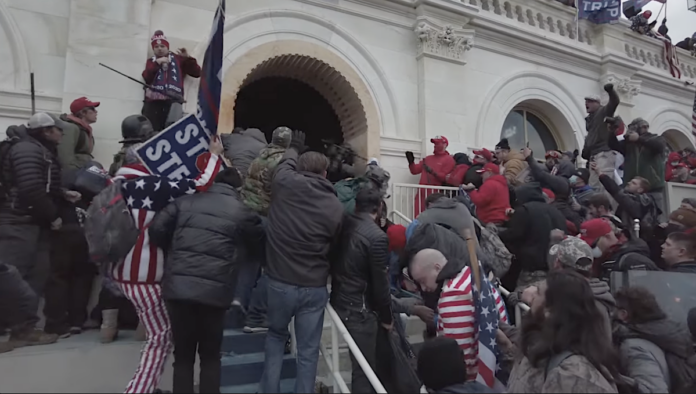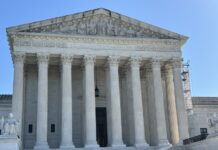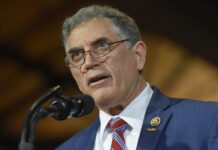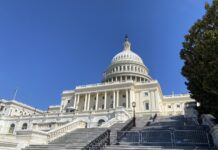
WASHINGTON (States Newsroom) — Barring a few exceptions, Senate Republicans on Tuesday largely deflected or altogether avoided questions about President Donald Trump’s broad clemency for over 1,500 defendants who stormed the U.S. Capitol on Jan. 6, 2021 — including many who beat police officers, smashed windows and trashed offices as lawmakers hid in designated safe areas.
Just hours into his second term Monday, Trump commuted the sentences of 14 felons, including leaders of the Proud Boys and Oath Keepers.
The president granted a “full, complete and unconditional pardon to all other individuals convicted of offenses related to events that occurred at or near the United States Capitol on January 6, 2021.” He also dismissed any pending indictments.
The pardons did not come as a surprise. As Senate Republicans were cheering for Trump on his march to electoral victory, the former and now current president exalted the “hostages” and “patriots” who injured more than 140 law enforcement officers and caused north of $2.8 million in damage to the Capitol, according to the Department of Justice.
Oath Keepers founder and Jan. 6 ringleader Stewart Rhodes told reporters Tuesday that it was “a good day for America.” Rhodes, who was released from federal prison in Cumberland, Maryland, faced an 18-year sentence for seditious conspiracy, among other crimes.
But Trump allies had earlier raised questions about releasing some defendants, including Vice President J.D. Vance, who told Fox News on Jan. 12 that “If you committed violence on that day, obviously you shouldn’t be pardoned.”
As of early January the government had charged just over 1,580 people for crimes related to the riot, 608 of whom were charged with assaulting, resisting or impeding law enforcement. Nearly a third of those charged with assaulting officers used a dangerous or deadly weapon, accordingto the Justice Department.
Investigations uncovered that weapons brought onto Capitol grounds included firearms, tasers, chemical sprays; edged weapons, including a sword, axes, hatchets, and knives; and makeshift weapons, including broken office furniture, fencing, bike racks, stolen riot shields, baseball bats, hockey sticks, flagpoles, PVC piping and reinforced knuckle gloves.
States Newsroom asked over 20 Republican senators if they are comfortable with Trump’s clemency orders, and followed up with some of the lawmakers who were willing to speak.
Trump ‘keeps his campaign promises’
Sen. Thom Tillis of North Carolina said he wasn’t comfortable with “any that involved an assault on a police officer.”
Sen. Lisa Murkowski told a group of journalists that she was “disappointed.”
“I do fear the message that is sent to these great men and women that stood by us,” the Alaska Republican said as she gestured toward the Capitol Police officers posted outside the Senate Republicans’ weekly luncheon.
Sen. Susan Collins of Maine said there’s a “distinction to be made between providing clemency for individuals who may have been caught up in the crowd that day and did not commit any violent act, versus those who assaulted police officers with their fists, with flag poles, with pepper spray, and destroyed property, broke into the Capitol by breaking windows.”
“I do not believe those individuals warrant clemency,” she said. Collins also released a written statement.
Sen. Josh Hawley of Missouri, who was photographed raising his fist in solidarity with Trump supporters as he exited the Capitol on Jan. 6, said “If you’re asking me if it’s what I would have done, what I’ve said is, is that for folks who committed violence, I wouldn’t commute their sentence or pardon.”
Hawley, who can be seen on security video running for safety during the attack, said the pardons send a signal that Trump “keeps his campaign promises.”
Biden pardons
When States Newsroom asked Sen. Deb Fischer if she was comfortable with the broad pardons, the Nebraska Republican responded, “I’m looking forward to getting some great opportunities and getting good things done.”
In response to a follow-up question on whether she condoned political violence, Fischer, who was on her way into Majority Whip John Barrasso’s office, said, “Ma’am, no one would ever condone political violence.”
As Sen. Markwayne Mullin walked by an entrance to the Senate chamber he greeted and shook the hands of Capitol Police officers posted at the doors.
The Oklahoma Republican refused to talk specifically about the Jan. 6 pardons, saying he didn’t get “near this many questions” about pardons issued by former President Joe Biden in his final hours in office.
“Here’s my thing on pardons, I’m not any more comfortable with Biden releasing and pardoning his whole family too,” Mullin said. “When you all want to cover both, come talk to me.”
States Newsroom reported Monday Biden preemptively pardoned lawmakers who served on the congressional committee to investigate the Capitol attack, as well as police officers who testified before the panel.
He also preemptively pardoned former administration officials who’ve been the target of death threats, as well as five of his family members — roughly a month-and-a-half after he pardoned his son, Hunter. Major news outlets published numerous articles covering Biden’s pardons.
Mullin walked away from a follow-up question highlighting violent acts committed by those who received Trump’s clemency.
Collins similarly said the press “ought to be paying attention” to Biden’s pardons as well, especially the commutation of indigenous activist Leonard Peltier.
Iowa’s Sen. Chuck Grassley, the most senior member of the Senate and the body’s president pro tempore, said, “Hey, everybody’s asked me about J6. None of you guys are asking about the Biden pardons.”
Sen. John Cornyn of Texas said “Congress doesn’t have a role to play in pardons” and walked away from further questions on the topic.
No response at all
Many GOP senators did not respond to clearly shouted, and many times repeated, questions from journalists Tuesday afternoon about the pardons.
They included Mike Crapo of Idaho, Barrasso of Wyoming, Marsha Blackburn of Tennessee, John Curtis of Utah, Lindsey Graham and Tim Scott of South Carolina, James Lankford of Oklahoma, Cindy Hyde-Smith of Mississippi, Shelley Moore Capito of West Virginia, Tommy Tuberville of Alabama and Joni Ernst of Iowa.
Blackburn and Curtis specifically said they don’t speak to reporters in the hallways of Congress.
Some GOP senators said they hadn’t yet seen Trump’s Monday night order.
“I haven’t looked at it yet,” said Sen. Rick Scott of Florida.
When States Newsroom summarized the 334-word proclamation and underscored that it was highly publicized by major news outlets, Scott replied “I haven’t looked at the executive order yet.”
Sen. John Kennedy of Louisiana said: “I don’t have anything for you.”
“You don’t have anything about people who came here with weapons and beat police officers?” States Newsroom pressed as Kennedy walked away.
Murkowski’s fellow Alaska senator, Dan Sullivan, stopped to speak to reporters about the “grand slam home run” executive order from Trump that expands energy development in his state, but he would not comment on the president’s clemency for Jan. 6 defendants.
“I need to read the order first,” he said.
Senate Majority Leader John Thune’s office did not respond to requests for comment. The South Dakota Republican briefly told reporters outside of a committee room, “We’re not looking backwards, we’re looking forward.”
States Newsroom reached out to all members of Senate and House Republican leadership for comment, including House Speaker Mike Johnson, a Louisiana Republican, but did not receive any response.







